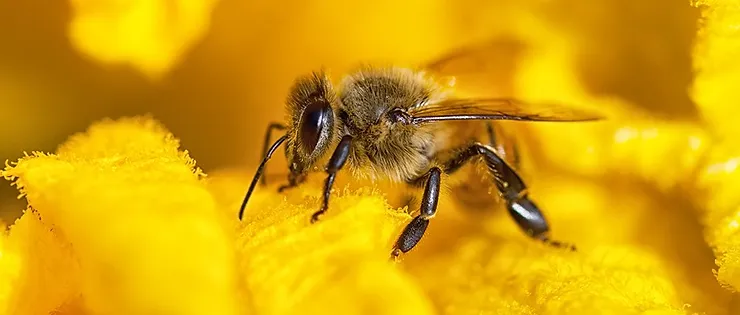By: Dhruv Sampath
Have you ever been stung by a bee? I have. It was painful, itchy, and annoying. For several years, I was afraid of bees. On a trip to the Cincinnati Zoo a few years ago, I learnt about the importance of bees. This changed my perspective and I was amazed by the role these little creatures play in the ecosystem. They aren’t pesky insects that want to sting people. They are like sheep—calm and quiet, as they fly in search of nectar. If you get scared and try to swat at a bee, it will agitate it, causing it to sting you. If you happen to encounter a bee, back away slowly and it won’t sting you. Trust me! We shouldn’t assume that they are pests. We must learn more about the important role they play in the ecosystem. Sadly, their population is shrinking. I hope to make a case for saving the bees.
Why are they important?
Bees are important because they provide numerous benefits to mankind. For instance, everyone wears clothes but do you know where they came from? Well, it came from cotton that a bee-pollinated. Without bees, we wouldn’t have a variety of fabrics at our disposal.
You know that bees make honey but did you know that honey isn’t just sweet and tasty? It has a lot of medicinal properties too. It helps heal burns, sores, and inflammation. Without bees, we wouldn’t have any tasty medicine that is delicious to eat and treats a lot of different wounds on our bodies.
Did you know that bees pollinate nearly 80% of crop varieties on Earth? Without bees, we are at risk of losing more than half of the worldwide production. In my opinion, many important aspects of our daily life are dependent on a healthy bee population. Imagine a world without clothes, one with little food and one without honey for pancakes! Fortunately, people are hard at work to save the bees. We need to understand the reason bees are in peril.
Varroa Destructor and Small Hive Beetles
The Varroa Destructor is one of the biggest causes of bees dying. It is a mite that sucks a blood-like fluid from bees. It can transmit diseases to a hive leading to its destruction.
One way to stop the Varroa mite is to use thyme essential oils which are not harmful to bees. Beekeepers have avoided using chemicals on hives and prefer thyme oil as a way to keep these destructive mites away. Some beekeepers prefer to avoid all chemicals and rely on keeping the hives clean and mite free.
Another bug that can destroy a hive is the small hive beetle which damages the comb, stored honey, and pollen. It is an invasive species from Africa. The small hive beetles are a type of beetle that eats everything in a hive, causes fermentation of the honey and creates a mess. Maintaining a clean apiary and honey house reduces the chance of having a beetle infestation.
How you can help save them
There are many ways we can help save the bees from further destruction, starting from our own backyard. Planting a garden is mutually advantageous to us and to the bees.
Secondly, does your family use pesticides? If the answer is yes, this practice could harm bees. It could reduce the viability of bee sperm resulting in less offspring. A pesticide that is not harmful to bees should be used instead such as etoxazole.
Finally, educating people and spreading the word about this issue will help prevent further damage. There are many ways to spread the word such as posters, articles and presentations etc. Think of this like the ocean. One drop of water seems small but a lot of drops can form an ocean. One poster or garden is small but a lot of them are colossal!
I hope I have convinced you of the importance of keeping the bees alive. They are essential to our lives, in danger, and need some help. I hope that you will help the bees even if you are just a kid. You can plant a garden or make a poster or a website. If we don’t do our bit, they won’t be busy bees and there may not be any bees at all! It might seem like a big job but it isn’t so. I hope you learned something and I hope you help yourself and everyone on planet Earth.











